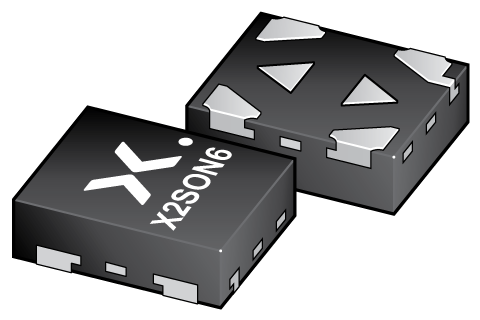Orderable parts
| Type number | Orderable part number | Ordering code (12NC) | Package | Buy from distributors |
|---|---|---|---|---|
| 74AUP1G157GX | 74AUP1G157GXZ | 935307358147 | SOT1255-2 | Order product |

Register once, drag and drop ECAD models into your CAD tool and speed up your design.
Click here for more informationLow-power 2-input multiplexer
The 74AUP1G157 is a single 2-input multiplexer. Schmitt trigger action at all inputs makes the circuit tolerant to slower input rise and fall times. This device ensures a very low static and dynamic power consumption across the entire VCC range from 0.8 V to 3.6 V. This device is fully specified for partial power-down applications using IOFF. The IOFF circuitry disables the output, preventing the damaging backflow current through the device when it is powered down.
Wide supply voltage range from 0.8 V to 3.6 V
CMOS low power dissipation
High noise immunity
Overvoltage tolerant inputs to 3.6 V
Low noise overshoot and undershoot < 10 % of VCC
IOFF circuitry provides partial Power-down mode operation
Low static power consumption; ICC = 0.9 µA (maximum)
Latch-up performance exceeds 100 mA per JESD 78 Class II
Complies with JEDEC standards:
JESD8-12 (0.8 V to 1.3 V)
JESD8-11 (0.9 V to 1.65 V)
JESD8-7 (1.65 V to 1.95 V)
JESD8-5 (2.3 V to 2.7 V)
JESD8C (2.7 V to 3.6 V)
ESD protection:
HBM: ANSI/ESDA/JEDEC JS-001 class 3A exceeds 5000 V
CDM: ANSI/ESDA/JEDEC JS-002 class C3 exceeds 1000 V
Multiple package options
Specified from -40 °C to +85 °C and -40 °C to +125 °C
| Type number | VCC (V) | Logic switching levels | Output drive capability (mA) | tpd (ns) | Power dissipation considerations | Tamb (°C) | Rth(j-a) (K/W) | Ψth(j-top) (K/W) | Rth(j-c) (K/W) | Package name |
|---|---|---|---|---|---|---|---|---|---|---|
| 74AUP1G157GX | 0.8 - 3.6 | CMOS | 1.9 / -1.9 | 3.2 | ultra low | -40~125 | 437 | 9.4 | 211 | X2SON6 |
| Type number | Orderable part number, (Ordering code (12NC)) | Status | Marking | Package | Package information | Reflow-/Wave soldering | Packing |
|---|---|---|---|---|---|---|---|
| 74AUP1G157GX | 74AUP1G157GXZ (935307358147) |
Active | aP |

X2SON6 (SOT1255-2) |
SOT1255-2 | SOT1255-2_147 |
| Type number | Orderable part number | Chemical content | RoHS | RHF-indicator |
|---|---|---|---|---|
| 74AUP1G157GX | 74AUP1G157GXZ | 74AUP1G157GX |
|
|
| File name | Title | Type | Date |
|---|---|---|---|
| 74AUP1G157 | Low-power 2-input multiplexer | Data sheet | 2023-07-12 |
| SOT1255-2 | 3D model for products with SOT1255-2 package | Design support | 2021-01-28 |
| aup1g157 | aup1g157 IBIS model | IBIS model | 2014-12-21 |
| Nexperia_document_leaflet_Logic_AUP_technology_portfolio_201904 | Nexperia_document_leaflet_Logic_AUP_technology_portfolio_201904 | Leaflet | 2019-04-12 |
| Nexperia_document_leaflet_Logic_X2SON_packages_062018 | X2SON ultra-small 4, 5, 6 & 8-pin leadless packages | Leaflet | 2018-06-05 |
| SOT1255-2 | plastic thermal enhanced extremely thin small outline package; no leads;6 terminals; body 1.0 x 0.8 x 0.32 mm | Package information | 2020-08-27 |
| SOT1255-2_147 | X2SON6; Reel pack for SMD, 7''; Q2/T3 product orientation | Packing information | 2020-05-08 |
| 74AUP1G157GX_Nexperia_Product_Reliability | 74AUP1G157GX Nexperia Product Reliability | Quality document | 2024-06-16 |
If you are in need of design/technical support, let us know and fill in the answer form we'll get back to you shortly.
| Type number | Orderable part number | Ordering code (12NC) | Status | Packing | Packing Quantity | Buy online |
|---|---|---|---|---|---|---|
| 74AUP1G157GX | 74AUP1G157GXZ | 935307358147 | Active | SOT1255-2_147 | 10,000 | Order product |
As a Nexperia customer you can order samples via our sales organization.
If you do not have a direct account with Nexperia our network of global and regional distributors is available and equipped to support you with Nexperia samples. Check out the list of official distributors.
The interactive datasheets are based on the Nexperia MOSFET precision electrothermal models. With our interactive datasheets you can simply specify your own conditions interactively. Start by changing the values of the conditions. You can do this by using the sliders in the condition fields. By dragging the sliders you will see how the MOSFET will perform at the new conditions set.